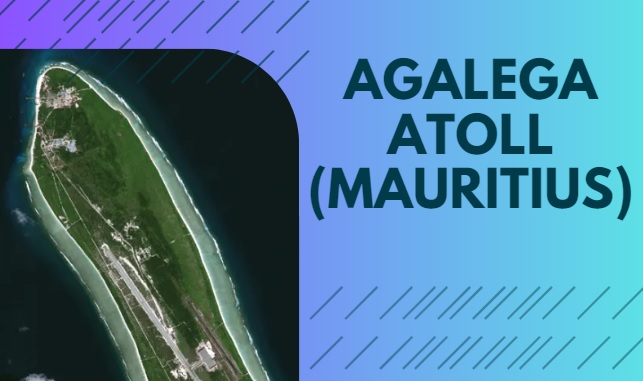The joint inauguration of the non civil installation on the Mauritian island of North Agalega Atoll marks a pivotal moment in the evolving strategic partnership between India and Mauritius. This collaborative effort holds multifaceted significance for both nations, encompassing economic benefits, strategic advantages, and the strengthening of diplomatic ties. The development is poised to play a crucial role in countering regional challenges, particularly in response to China’s expanding influence in the Indian Ocean Region.

In a notable development, the inauguration of an India-built airstrip on Agalega Island in Mauritius took place with the participation of Prime Minister Narendra Modi and his Mauritian counterpart Pravind Jugnauth. This event underscores India’s profound strategic interests in the Indian Ocean region, particularly in response to the evolving presence of China. The joint inauguration, conducted via a video conference on February 29, marked the completion of several development projects supported by India in the two-island Mauritian dependency. With a keen focus on maritime security and strategic imperatives, India’s endeavors in the Indian Ocean are intricately linked to the changing geopolitical dynamics, exemplified by collaborative initiatives with Mauritius and ongoing developments in the Maldives.
Enhanced Maritime Surveillance and Security
Strategically, the military installation strengthens Mauritius’ maritime surveillance and security capabilities. The deployment of the Coast Guard to Agalega enhances the nation’s ability to monitor its maritime borders, providing a heightened level of security in the strategically important southwestern part of the Indian Ocean.
Why Atolls are Strategically Important
Atolls assume strategic importance for nations owing to their distinct geographical features. Situated strategically within oceans, these circular coral formations provide an advantageous platform for countries to establish military bases, bolstering maritime surveillance and defense capabilities.
Their location further enables nations to claim Exclusive Economic Zones, facilitating economic growth through access to marine resources. Moreover, the ecological richness of atolls attracts scientific research and tourism, contributing to national prestige and economic development. In the context of climate change, the vulnerability of atolls serves as a diplomatic focal point for environmental concerns. In essence, the strategic significance of atolls encompasses geopolitical positioning, military preparedness, economic opportunities, and environmental considerations, rendering them invaluable assets on the global stage.
Strengthening India-Mauritius Relations
The initiative underscores the commitment to deepening India-Mauritius relations, fostering enhanced goodwill, and promoting multi-dimensional cooperation. The collaboration not only serves economic interests but also reflects a shared commitment to regional stability and security.
Agalega Atoll, strategically positioned approximately 684 miles northeast of mainland Mauritius in the southwestern Indian Ocean, holds profound geopolitical significance. The transformation of this remote atoll into a military installation by India underscores its pivotal role in bolstering maritime domain awareness and addressing regional dynamics, notably countering China’s “string of pearls” strategy.
The establishment of an airfield, port, and communication hub on Agalega constitutes integral elements in India’s broader strategic framework, forming a vital link within the “necklace of diamonds” aimed at safeguarding maritime security in the Indian Ocean Region. This collaborative initiative between India and Mauritius not only contributes to regional stability but also signifies a shared commitment to cooperative security, establishing Agalega as a hub with extensive implications for the ever-evolving geopolitical landscape in the Indian Ocean.
Reduced Travel Time, Job Creation, and Tourism Potential
Mauritius stands to gain economically from this joint initiative, with the establishment of an airfield, port, and communication hub on North Agalega Island. The reduced travel time, coupled with the development of infrastructure, is expected to create job opportunities and unlock the untapped tourism potential of the atoll.
Countering China’s Influence
From a geostrategic perspective, India’s move to establish a military presence on Agaléga aligns with its broader maritime strategy, countering China’s ambitious “string of pearls” approach. The initiative supports India’s SAGAR (Security and Growth for All in the Region) initiative and reinforces its role as a peace provider in the region. The military base on North Agaléga serves as a key element in India’s response, forming part of its strategic “necklace of diamonds” to safeguard maritime security in the Indian Ocean.
Conclusion
The joint inauguration of the military installation on Agalega Atoll signifies a milestone in India-Mauritius collaboration, with far-reaching implications for economic development, regional security, and diplomatic relations. As India reinforces its commitment to safeguarding the Indian Ocean, the Agalega project becomes a symbol of strategic foresight and cooperation in the face of evolving geopolitical dynamics.
FAQ- Agalega Atoll Mauritius
What is Atoll?
An atoll is a distinctive geological formation characterized by a ring-shaped coral reef, often encircling a central lagoon. They are prevalent in warm tropical waters, particularly in the Pacific and Indian Oceans.
Where is Agalega Atoll located?
Agalega Atoll is located in the southwestern Indian Ocean, approximately 684 miles northeast of mainland Mauritius.
What is the significance of Agalega Atoll?
Agalega Atoll holds strategic importance due to its geographical location.
Why is India establishing a military base on Agalega Atoll?
India’s decision to establish a military base on Agalega is part of a comprehensive strategy aimed at addressing regional challenges, particularly countering China’s influence in the region.

